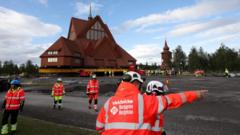In an unprecedented deluge, Mumbai is grappling with knee-deep flooding that has paralyzed daily life and forced hundreds into shelters.
Mumbai Flooding Forces Mass Displacement Amidst Record Rainfall

Mumbai Flooding Forces Mass Displacement Amidst Record Rainfall
Severe weather inundates India's financial hub, stranding residents and disrupting transport.
Heavy rainfall in India's financial capital Mumbai has thrown life into disarray, with considerable flooding halting transportation and resulting in mass evacuations. Reports indicate that many areas are submerged under waist-deep water, prompting some residents to navigate through the floodwaters. In an emergency effort, civic authorities have rescued around 600 individuals stranded on an overcrowded monorail system that halted abruptly. Of those rescued, at least 23 suffered from suffocation and required medical attention.
Numerous schools and colleges remain closed due to the water emergencies, and over 350 people have been relocated from precarious low-lying regions to temporary evacuation centers. The India Meteorological Department has advised a red alert for Mumbai and surrounding districts, predicting continued heavy rains. However, they also project that conditions might improve by the end of the week.
The city has already accumulated an astounding 800mm of rainfall in the last four days, with 21 reported fatalities related to rain-induced accidents over the same period. Commuter services have been severely disrupted, with local trains—vital for millions—experiencing significant delays, leaving passengers stranded at stations for hours.
Additionally, the Mumbai international airport has seen a wave of cancellations, with 50 flights grounded recently due to adverse weather conditions. Airlines are alerting travelers about possible further congestion as rains are expected to persist.
After the monorail system malfunctioned, leading to chaos onboard, police and fire rescue teams had to use cranes to bring passengers to safety. Preliminary reports link the incident to severe overcrowding on the train.
Criticism has emerged from opposition lawmakers who argue that the government was unprepared for the heavy downpours, citing an "absolute collapse of governance." Citizens have echoed these sentiments on social media, calling out insufficient infrastructure and a lack of planning, particularly regarding drainage systems, amidst ongoing urban development.
As Mumbai’s dense population continues to swell due to migration from various states, the demand for more robust climate-resilient infrastructure grows ever urgent.
Numerous schools and colleges remain closed due to the water emergencies, and over 350 people have been relocated from precarious low-lying regions to temporary evacuation centers. The India Meteorological Department has advised a red alert for Mumbai and surrounding districts, predicting continued heavy rains. However, they also project that conditions might improve by the end of the week.
The city has already accumulated an astounding 800mm of rainfall in the last four days, with 21 reported fatalities related to rain-induced accidents over the same period. Commuter services have been severely disrupted, with local trains—vital for millions—experiencing significant delays, leaving passengers stranded at stations for hours.
Additionally, the Mumbai international airport has seen a wave of cancellations, with 50 flights grounded recently due to adverse weather conditions. Airlines are alerting travelers about possible further congestion as rains are expected to persist.
After the monorail system malfunctioned, leading to chaos onboard, police and fire rescue teams had to use cranes to bring passengers to safety. Preliminary reports link the incident to severe overcrowding on the train.
Criticism has emerged from opposition lawmakers who argue that the government was unprepared for the heavy downpours, citing an "absolute collapse of governance." Citizens have echoed these sentiments on social media, calling out insufficient infrastructure and a lack of planning, particularly regarding drainage systems, amidst ongoing urban development.
As Mumbai’s dense population continues to swell due to migration from various states, the demand for more robust climate-resilient infrastructure grows ever urgent.


















